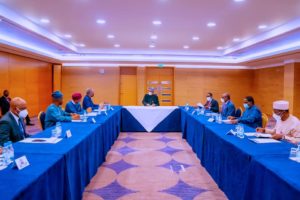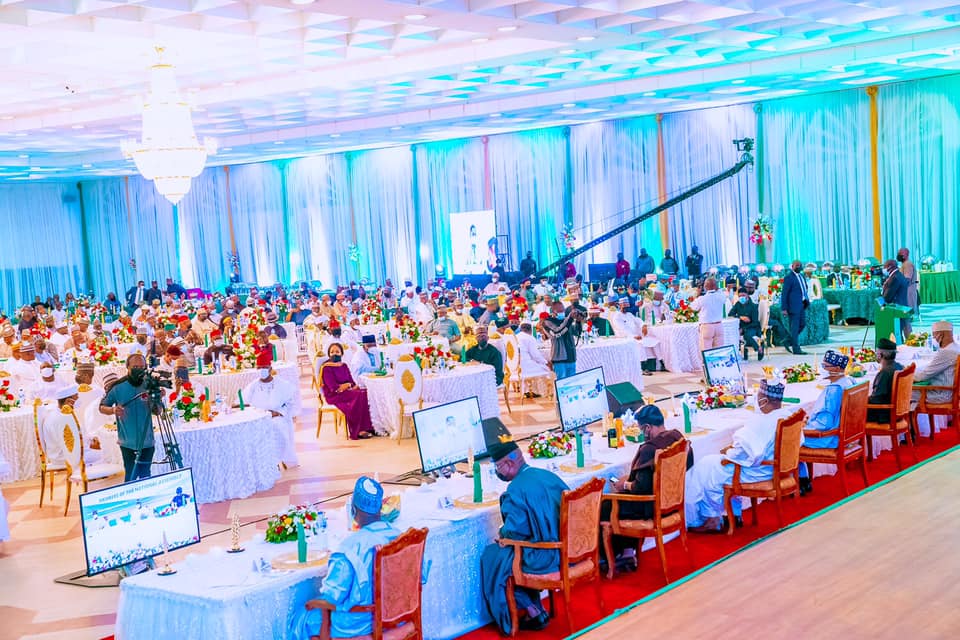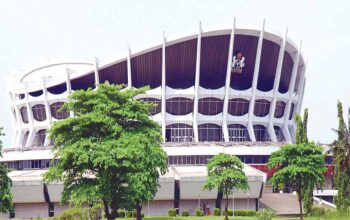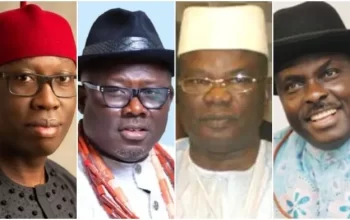
Nigeria will be glad to receive support from the Commonwealth in diverse areas of needs and challenges, President Muhammadu Buhari has said.
The President spoke during a bilateral meeting Thursday with Commonwealth Secretary-General, Baroness Patricia Scotland, at the sidelines of the Global Education Summit holding in London, United Kingdom.
Saying Nigeria was doing a lot to address food security through heavy investment in agriculture, and the security issues confronting the country in different regions, President Buhari welcomed the offer of assistance by the Commonwealth scribe.
Baroness Scotland said the Commonwealth had developed programmes on agribusiness, adding value to agriculture products for young people to get involved, climate change, criminal justice reforms, police reforms, and security, inviting Nigeria to benefit from technical assistance that can be provided.
She added that since President Buhari was the Champion for Anti-Corruption in Africa, the Commonwealth has developed anti-corruption benchmark tools, and would like to work with Nigeria in both public and private sectors.
Other areas the Commonwealth could assist, according to Baroness Scotland, include countering violent extremism, trade, and modalities to implement the African Continental Free Trade Agreement (AfCFTA).
Femi Adesina
Special Adviser to the President
(Media and Publicity)
July 29, 2021
PRESIDENT BUHARI SAD OVER DEATH OF 5 CORPS MEMBERS
President Muhammadu Buhari is deeply saddened by the death of five prospective corps members in a motor accident on Abaji/Kwali expressway, Abuja on Wednesday, July 28, 2021.
The President joins the board, management and staff of the National Youth Service Corps (NYSC) in paying tribute to those who lost their lives in the tragic accident.
Commiserating with the families of the youngsters, the President assures that Nigerians share their grief and would continue to uphold them in prayers through this difficult time.
The President extends best wishes to all corps members on national service as well as new call-ups in various orientation camps across the country.
President Buhari reaffirms that the welfare and security of these young Nigerians, who have obeyed the call to serve the nation with dedication and selflessness, will remain a key priority of government, even as the sacrifices of the fallen youths will never be forgotten.
Femi Adesina
Special Adviser to the President
(Media & Publicity)
July 29, 2021
ENHANCING SOCIAL INTEGRATION AND REGIONAL CONNECTIVITY – SPOTLIGHT ON THE SECOND RIVER NIGER BRIDGE
One of the most profound sayings in the southeast region of Nigeria, is an adage that says, “The world is a marketplace”. When put in clearer context, this adage carries two meanings, the first, which seems to be the most obvious is that the Igbo ethnic nationality, fondly called Ndigbo, spread across the southeast and parts of the South-South, are majorly traders and business-minded people. The second, which carries a deeper connotation, is that the marketplace is the core of social, community and business interaction.
Prominent in this region is the city of Onitsha, a town located on the eastern bank of the Niger River. Onitsha is the economic hub of commerce and industry in the South-East geopolitical zone of Nigeria. It hosts the largest market in Africa in terms of geographical size and volume of goods and is strategically positioned as a regional hub for trade, business, and logistics in the region. Regardless of the several business ventures and investments that people from the South-East have scattered around the country, every end of year, during the festive season, almost everyone from the region comes back home to meet with their kinsmen, celebrate their achievements and engage in cultural activities.
Homecoming is everything. It offers the most valuable opportunity for integration. This integration alongside an impressive ingenuity for business and trade across the region has fostered an inspiring degree of social mobility that continues to drive economic growth and development in the region and across the country. In the middle of this all, stands, the Niger bridge, a symbol of hope, commerce, culture, and progress.
After over 50 years of connecting people both within and to the region, regular traffic, imposing heavy static loads on the bridge is taking a toll on the first Niger Bridge, giving rise to the urgent need for a second bridge crossing – The Second River Niger Bridge. For many stakeholders in the region, the completion of the Second River Niger Bridge will be a dream come true, as many have spent an important part of their lives looking forward to the impact and immense benefits that the bridge will bring to their personal lives, social engagements, and businesses.
A project of the Federal Government, through the Ministry of Works and Housing, in collaboration with the Nigerian Sovereign Investment Authority, the Second River Niger Bridge is expected to, among other things, minimize traffic congestion affecting the current bridge and ensure a safe and sufficient river crossing.
The Second River Niger Bridge is not just another regional amenity; it is a key national infrastructure that will play a major role in enhancing everyday life and social integration for dwellers while also driving trade and economic activities. As a significant bridge in the region and the nation, the Second River Niger Bridge will contribute immensely to the expansion of a well-developed road transportation network, providing ease for commuters and enhancing regional connectivity. It will make homecoming even sweeter.
Handling the construction of this bridge is Julius Berger, the company known for its quality and reliability, which has delivered some of Nigeria’s most important buildings and infrastructure and demanding engineering feats, such as the Lekki-Ikoyi Bridge in Lagos.
For the average resident in the South-East and environs, the drive for progress is an everyday activity. From making large supplies and sales on a regular basis, to expanding chain stores, or even successfully climbing the ladder of the apprenticeship system, to become a proud business owner. These amongst other stories of advancement, are the kind of progress, the Second River Niger Bridge will enable once completed. With the Second River Niger Bridge, inter-state travel within the region becomes more convenient. Social and economic integration also becomes more enhanced. It would also foster trade activities and other commercial engagements, like transporting raw materials and finished goods to factories, warehouses, suppliers, distributors, stores, and the end-consumers.
As shown on the project microsite where progress on the bridge is made transparent to the public, so far, reports around the ongoing construction, show good progress on the Second River Niger Bridge Project since commencement. For example, the superstructure is in progress, the geotechnical design and In-construction service are recording good and steady developments; the culverts have been completed, while work is in progress on both the Owerri Interchange and the Toll Station.
The project has started to deliver value for the community and this progress we can hope to continue till the full completion of the Second River Niger Bridge project.
– By Nnamdi Ogbo, Asaba



